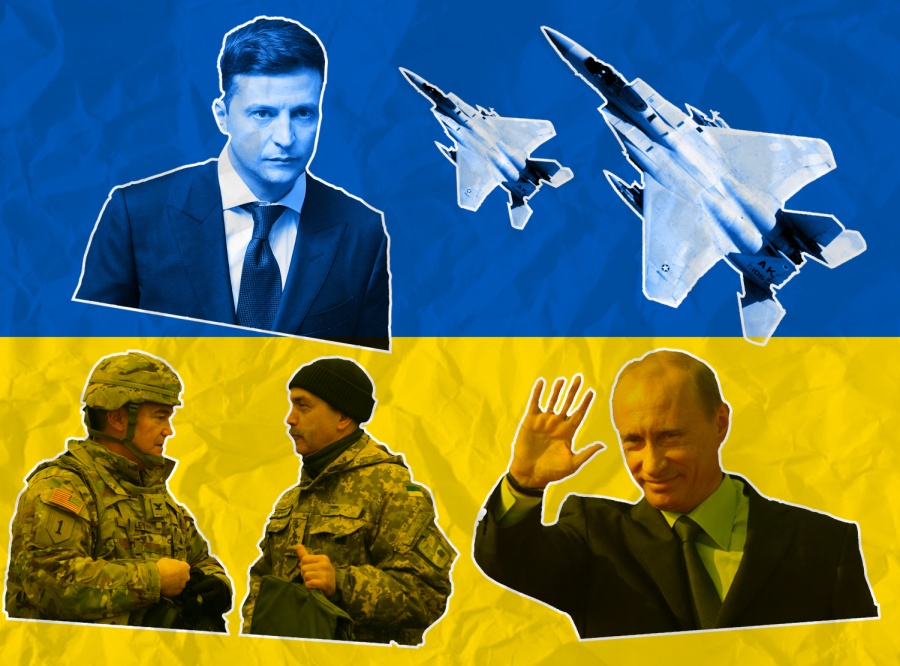Perspective | Ukrainian Student Association reacts to Russia’s ‘hybrid war’ against Ukraine
February 3, 2022
The Ukrainian Student Association is a registered student organization at the University whose purpose is to bring awareness to Ukrainian culture, traditions and history on campus.
The RSO creates a forum where Ukrainian subject matters can be openly discussed and heard and provide an inclusive community for all interested students with an emphasis on creating an environment of multicultural embracement amongst all members of all backgrounds.
In light of the recent escalating tensions along Ukraine’s eastern border, Larysa Brandys and Daniel Brandys, president and vice president of the Ukrainian Student Association, respectively, recently met with Dr. Roman Ivashkiv, senior lecturer and Language Program coordinator in the Department of Slavic Languages & Literatures at the University.
Larysa and Daniel both grew up in the Ukrainian diaspora in Chicago, where they learned extensively about Ukraine’s history, culture and language over the course of 12 years through their attainment of a degree in Ukrainian Studies from the Ukrainian School of Chicago — and have been following the Russian-led war in Eastern Ukraine since its start in 2014.
They were eager to speak with Dr. Ivashkiv and gain further insight into the current situation from someone native to Ukraine. In late January, NPR reported, “roughly 100,000 Russian troops remain stationed along the border.”
Get The Daily Illini in your inbox!
According to Dr. Ivashkiv, “Russia’s illegal annexation of Crimea in 2014 and the invasion of eastern Ukrainian Donbas is not the first time Putin has blatantly violated international law with impunity.”
“In the early 1990s, Russia created ‘frozen conflicts’ in Moldovan Transnistria and remains involved in Nagorno-Karabakh (the dispute between Azerbaijan and Armenia),” Dr. Ivashkiv said. “In 2008, Russia annexed parts of Georgia (South Ossetia and Abkhazia). Back then, western democracies remained rather silent and continued to not only appease Russia but to trade with it and to heavily rely on its natural resources (e.g., oil and gas).”
Considering an established precedent, what could be propelling the threatening concerns we are seeing today along Ukraine’s Eastern front? Ivashkiv posited: “Today, emboldened Putin — who has failed to improve Russia’s economy and instead sought external enemies and blamed Russia’s misfortunes on the West — is threatening to further invade Ukraine, which has resisted the Russian aggression for eight years and already lost more than 14,000 people.
“Putin’s most current blackmailing attempt is premised on an absurd claim that Russia feels ‘threatened’ by NATO, even though since its establishment in 1949 the alliance hasn’t invaded a single country.
“Putin’s justification that Russia is invading Ukraine because it needs to protect itself from NATO is merely propaganda. His real fear is that some former Soviet republics, which today are independent sovereign states, are finally becoming democratic (i.e., they gradually manage to run free and fair elections, build civil societies and fight the Soviet-inherited corruption).
“Putin, who has remained in power for 21 years, cannot accept Ukraine’s independence and its success — albeit slow — in building a democracy. Both Ukraine and Georgia, the two countries that Putin has repeatedly tried to destabilize, have recently had revolutions (e.g., most recently, the 2014 Ukrainian Revolution of Dignity).
“People in those countries were not afraid to take to the street when there was no other way to change corrupt and criminal pro-Russian governments.
“For Putin, these revolutions were bad signs because eventually Russians, despite intimidation and persecution, may protest as well. In fact, some already have protested but these protests were brutally squashed.”
During their discussion, Larysa mentioned how she sees coverage in the media frequently refer to the present situation as a “conflict” as opposed to a “war” and asked Dr. Ivashkiv to clarify what he sees as the more accurate term.
Dr. Ivashkiv asserted that it is critical to distinguish this current situation not simply as a conflict, “Russia-fomented insurgency,” or a civil war, as Russia likes to portray it. Rather, it is a war led by Russia on Ukraine. What Dr. Ivashkiv sees as especially unique and dangerous about this war is that it is a “hybrid war” consisting not only of actual combat, but also of “cyber attacks, espionage and propaganda disseminated through social media and official Russian channels” with the overall goal of causing chaos and destabilization.
On the topic of Russia’s perceived role on the international stage, Ivashkiv felt that “another motivation behind Putin’s actions is his dissatisfaction with Russia no longer being a superpower, while the USA and the European Union have retained their geopolitical influence.
“Putin continues to assume that former Soviet republics should stay in what he refers to as Russia’s ‘sphere of influence.’ In other words, Russia cannot come to terms with the fact that these republics (like Lithuania, Latvia, Estonia, Moldova, Georgia and Ukraine, among others) have their own identities, national languages (even though they all understand Russian), and values.
“Putin desperately tries to restore the Soviet Union, even though nobody in their right mind wants back to the USSR in any shape or form.
“Currently, a large international coalition, led by President Biden and Secretary Blinken and supported by Canada and the UK, as well as by Poland, Lithuania, Latvia and Estonia — the countries located close to Russia — are still trying to use diplomatic means to deter Putin and end this insane bravado.”
The Ukrainian Student Association stands with Ukraine in its pursuit of a true democracy and continued fight against Russia. The Ukrainian Student Association’s Executive Board and members appreciate the opportunity to educate the University community about Ukrainian current events as well as to provide a Ukrainian community on campus for all students.
Larysa Brandys is a senior in LAS.
Daniel Brandys is a junior in LAS.







